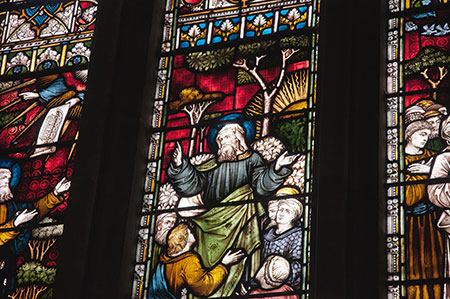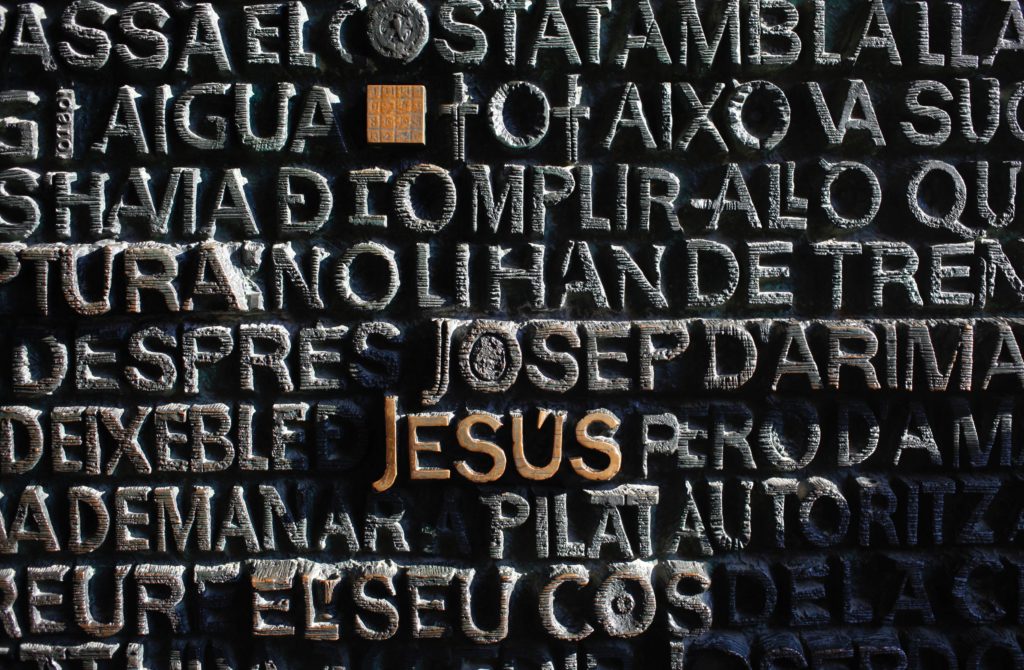The Rev. Marianne Wells Borg
Fifth Sunday after the Epiphany
February 4, 2018
Trinity Episcopal Church Bend, Oregon
Mark 1:29-39/Psalm 147: 1-11
He heals the brokenhearted and binds up their wounds… He lifts up the downtrodden…
We are almost at the end of the season of Epiphany in our church year. We all know Christmas is a big deal. Lent which is soon upon us, also a pretty big deal. Easter for some penultimate. Pentecost, the coming of the Spirit, that’s a pretty big deal too. But Epiphany? It doesn’t always get a lot of press. But I love this season. And I love the word Epiphany. When I was a little girl I named a house plant Epiphany. Even though I didn’t know what it meant.
Well, according to Webster, Epiphany means a manifestation or perception of the essential nature or meaning of something.
An intuitive grasp of reality through something – such as an event – usually simple and striking. An illuminating discovery. A realization or disclosure.
Epiphany: to understand or become conscious of.
Epiphany is the perfect name for this season in our church year. At Christmas Jesus comes to us as one unknown. What child is this? And then stories are told about him. And more stories… in an attempt to disclose what is essential about him. What his life might mean for ours. Hence, the season is called Epiphany.
Last week Jed mentioned that each Gospel presents an inaugural act that sets the theme for the entire gospel and serves as the initial epiphany or disclosure of the importance of Jesus for that Gospel writer. In Mark the first public act is setting someone free from a debilitating condition. For Mark, Jesus is first and foremost a healer. And today’s gospel continues this theme.
Simon’s mother-in-law was in bed with a fever. As soon as Jesus entered the house he is brought to her. “He came and took her by the hand and lifted her up.” He came and took her by the hand and lifted her up. And the fever left her. And when the word got out “everyone was searching for him.”
This scene and the seemingly simple gesture of taking someone by the hand and lifting them up, reveals a lot about Jesus. Jesus comes near… regardless of your condition. He acts and that action, taking you by the hand, has the power to release you from what embeds you and lifts you up so you can stand.
He was a healer for all
 Jesus wasn’t concerned about contagion or impurity or keeping a safe distance. For him no one was untouchable or to be ignored. Jesus’ hand extended to anyone. Everyone. He was a healer for all. Not just for some.
Jesus wasn’t concerned about contagion or impurity or keeping a safe distance. For him no one was untouchable or to be ignored. Jesus’ hand extended to anyone. Everyone. He was a healer for all. Not just for some.
Simon’s mother-in-law was embedded by fever.
We might metaphorize this condition for ourselves.
We may have fevered thoughts from anger or betrayal… Maybe something from the past makes us shiver and fret. We may know what it is. We may not. But it has us in its grip. Maybe some of us feel confused and distraught by beliefs we hold about ourselves but they no longer serve us. And they may not have been true in the first place. This realization brings on a cold sweat.
Maybe some of us are coming to terms with what has driven us our entire life and now we wonder, “why did I work so hard for that??” and we may fear we cannot redeem the time.
Some of us may simply feel beside ourselves. Just not quite right.
We may feel tightly surrounded by any number of things, embedded by them, and we wish we could get over it.
Your condition
Things befall all of us. All of us. We all suffer from conditions of one sort or another. But you and your “condition” are not one and the same. It may seem that way but it’s not really true. Jesus knows the difference. Your “condition,” however it came to you, does not keep him from you. You are never hidden from him. And that is a good thing. He comes near and reaches out his hand to lift you up. He evokes your strength. And you stand.
In the Hebrew tradition the hand is considered “the instrument of instruments.” It is not only the symbol of human action but the symbol of God’s as well. To “put forth your hand,” also signals a beginning. In the act of taking hand, helping one another, something is inaugurated… a change, a release, from being embedded to being set free.
The gospel writers knew this tradition. So did the hearers of the story that we hear today. This seemingly simple gesture, Jesus taking someone by the hand, has the power to redeem a life.
He lifts up all of humanity
There is a story in a non-canonical 4th century gospel, one that didn’t make it into the New Testament (it’s called the Gospel According to Nicodemas) that has at its centerpiece Jesus reaching out his hand and lifting up not just one person but all of humankind. He lifts up all of humanity. That’s the kind of healer Jesus was.
Ten centuries later this very scene, from this 4th century gospel, is written in an icon called the Anastasis. Which from the Greek means “to recover from a debilitating condition.” This icon may be more familiar to some of us as The Harrowing of Hell or The Descent into Hell.
I want to describe the details of this gospel story and icon because I think it is important and interesting how this image, of Jesus taking you by the hand, became an epiphany for a theological insight.
Jesus is pictured “descending into hell.” (A story line we recite as part of our Apostles’ creed, our oldest creed. He was crucified, dead and buried. He descended into hell.)
The ancient world imagined an underworld, Hades, Hell beneath heaven and earth where the dead were sent.
Jesus is wearing a flowing white garment detailed with orange. It suggests the radiance of his countenance, light in this otherwise dark place. His cape is flying away. Up behind him. He is descending. He is not ascending but descending.
And he breaks asunder the heavy bronze gates of Hades. Iron bars, locks and bolts are snapped. There’s enough metal debris cast about to stock a small hardware store. Everything that has kept the dead in their prison graves is loosed.
Jesus lifts them up
Jesus reaches out to the “first man” Adam and the “first woman” Eve. He grasps their wrists, lifts them up, frees them from the gravity of their condition.
Other Old Testament figures are seen to Jesus’s right and left. The kings, David and Solomon, John the Baptist and Moses, Abel, the first victim of murder and violence. All lifted up. All released from their debilitating condition. From their captivity and imprisonment. Their sorrows. And exile. The injustices and violence done to them or by them… All lifted out of the machinery of death and despair. Jesus liberates them from the weight of their own history. And no one is left behind. No one.
Some variations of this icon show contemporaries of the iconographer to underscore that Jesus’ actions continue to this day.
Jesus will not rise until we all do. Jesus will not rise until we all do.
That is the great epiphany.
Resurrection, it is suggested, is communal. Healing, salvation, release from what ails us or debilitates us, is not an individual act alone. It is also a communal act. And Jesus makes sure that no one is left behind.
I would hate to think that the reason that 4th century non-canonical gospel, didn’t make it into the New Testament was because of this epiphany. That Resurrection is communal. And no one is left behind. What was understood even in the ancient world, and what we understand today, is that humanity is inexorably linked together. We are all in this together. Our fate is interconnected.
Resurrection is here and now or it is of no earthly good to us. And if we do not all rise how can we say any of us do.
This is something for us to think about… The Eastern Church accepted this insight more than the Western Church: Jesus will not rise until we all do. He was that kind of healer.
Someone once said, Jesus cannot convince someone of God’s love only you can. Jesus cannot convince someone of God’s love. Only you can.
Reach out. We all need help. Take someone by the hand. There is power in this seemingly simple act. We must help each other to be lifted up. That is our task.
There is no us and them. There is no chosen or un-chosen. There is no outcast or irredeemable. There is no worthy or unworthy. If someone is in trouble, act. And leave no one behind. No one.



